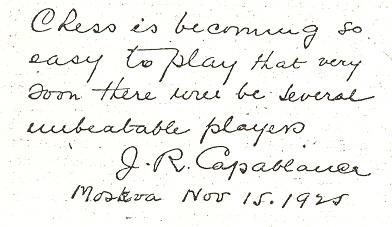
Edward Winter
‘We hazard no guesses as to the outcome of hypothetical matches. Such predictions can so often become predicaments.’
D.J. Morgan (BCM, August 1954, page 264).
Chess Notes avoids making predictions but often cites other people’s.
***
V.N. Panov’s biography of Capablanca (Moscow, 1970 edition, page 19) states that in February 1909 Lasker predicted that Capablanca would beat Marshall in the forthcoming match, and that the Cuban might well be a future world title challenger. Do any other sources confirm this?
(404)
From page 8 of Kings of the Chess Board by Lajos Steiner (Roseville, 1948):
‘I was not really surprised when, before the Hastings Christmas Tournament of 1934, Lilienthal half jokingly told me that he would beat Capablanca with a queen sacrifice, then he would give Capablanca his autograph. Lilienthal could never forget that in Paris a few years previously Capablanca refused to give him his autograph. And, to the surprise of the spectators, Lilienthal’s prophecy came true! Never in his life was Capablanca so crushingly defeated by a queen sacrifice.’
We would like other examples of prophecies that were fulfilled.
(1294)
Ed Tassinari (Scarsdale, NY, USA) makes a contribution:
‘From Chess Life, November 1962, page 261, a piece by the US team captain Eliot Hearst on the Varna Olympiad describing Fischer’s victory over Najdorf:
“Bobby told Najdorf the day before that he would beat him in 25 moves and he kept his promise, winning very neatly in 24 moves.”’
(1359)
W.D. Rubinstein (Victoria, Australia) writes:
‘The chess column (15 January 1947, page 14) of The New Citizen (a magazine aimed at recent migrants to Australia) written by A. Wolfers contains the game Botvinnik v Levenfish, 1940, with the comment, “A beautiful game by the future world champion”. (Wolfers predicted that Botvinnik and Euwe would finish first and second in the 1948 match-tournament.)’
Wanted: other confident predictions of world champion status, both those which proved uncannily accurate and those which were wildly inaccurate.
(1769)
From Ed Tassinari:
‘In January 1947, El Ajedrez Español published an interview with Najdorf titled “I am Going to Be World Champion”, excerpts of which later appeared in the March 1947 CHESS, page 169.’
Richard Lappin quotes from an unsigned item (by Lasker?) on page 200 of the August-September 1906 issue of Lasker’s Chess Magazine:
‘Schlechter, it appears, was about to challenge Dr Lasker for the championship, when he heard of the failure of Lasker-Maróczy; but was prevented by being headed off by Marshall. Schlechter, by virtue of his great victory at Ostend this year, would have been fully entitled to issue such a challenge, and should a match between him and Dr Lasker ever take place, it will, probably, prove the most stubborn chess match ever contested.’
Richard Lappin also points out that page 250 of the October 1906 issue of the same magazine quotes some dubious cub reporting from the Indianapolis Sun of 20 November:
‘... Marshall, in January, plays Dr Lasker, of Philadelphia [sic], for the American [sic] chess championship. The match with the Philadelphia player is scheduled to start Jan. 4. It has attracted the attention of the chess world. Most of the knowing ones pick Marshall as the winner, for he is rising in the science of the game, while the Quaker City physician [sic], chessplayers believe, has about reached his capacity.’
(1815)
From time to time we publish notable predictions, whether fulfilled or not. In a talk at the Manhattan Chess Club on 11 January 1916 Dawid Janowsky opined ‘that international chess in Europe was dead for at least 20 years to come’. (Source: Brooklyn Daily Eagle, 12 January 1916.)
(2172)
From page 391 of Kings, Commoners and Knaves:
In La Nación in 1930 Alekhine described Flohr as ‘the second true talent to have emerged in the chess world since the War (the first was the Mexican Torre)’. The world champion also predicted ‘an exceptional chess future’ for Flohr.
Source: El Ajedrez Americano, August 1930, page 227.
‘It is fairly safe to prognosticate that for the next five years at least, Alekhine will be able to retain his title.’
Euwe in the Nieuwe Rotterdamsche Courant, an article reproduced on pages 150-153 of The Chess World, 1 January 1933.
In the same issue (pages 174-175) Alekhine was interviewed. Asked whether he thought that anybody could beat him, he replied:
‘No, I don’t think so. I have beaten them all, although I only beat Capablanca by a small margin. I just want to hold my own against my own generation. If one of the younger generation came along and beat me – well ... I don’t care.’
Bernd Graefrath (Mülheim an der Ruhr, Germany) points out this passage from page 57 of The Sorcerer’s Apprentice by D. Bronstein and T. Fürstenberg (London, 1995), concerning Wexler v Bronstein, Mar del Plata, 1960:
‘Before this game I had a friendly talk with our Ambassador to Argentina N. Alekseev and I promised him that I would try to win today with a queen’s sacrifice. And so I did!’
(2251)
In L’Eclaireur du soir (Nice) of 25 June 1929 Georges Renaud recalled some remarks by the recently deceased Richard Réti:
‘I see no reason why I should not be world champion one day. If an extraordinary Wunderknabe is not being bottle-fed somewhere at the moment, I shall be world champion at 50. That is because I do not have genius. Lasker, Capablanca and Alekhine have genius. They cannot progress. I do not even have talent, I owe everything to my work, and I am making progress every day. One day I shall overtake them. And if the Wunderknabe does not arrive beforehand, I shall be champion of the world.’
Renaud reported that Réti’s smile and sparkling eyes indicated that he only half believed his claim.
Elsewhere in the article Renaud stated that after playing 24 games blindfold in Haarlem on 6 August 1919, Réti conducted a private experiment against Euwe and Oskam, each of whom took 18 boards against him. Réti managed to play blindfold the first eight moves of all 36 games, but then decided to venture no further with the trial.
(2303)
From page 32 of the February 1943 BCM:
‘Vassily Smyslov is a student at the Moscow Aircraft Institute, and is 21 years old. Nevertheless he has earned a place among the six chess grand-masters of the Soviet Union. … Great maturity, level headedness and confidence mark Smyslov’s playing in spite of his youth, and many of his admirers predict that he will be a candidate for the world championship.’
(2484)
From page 67 of The Community of the Future by Emanuel Lasker (New York, 1940):
‘It is about 30 and some years ago that Isaac L. Rice, the builder of submarine vessels, in a talk with me predicted the coming of the age when technological invention would supersede the niceties of military strategy. He mentioned big, long range, accurately aimed guns and the possibilities of bombing. If he lived today, he would probably specify his prophecy still further. The evolution in the direction of military equipment is almost automatic. To bend the discoveries and conquests of the intellect towards a destructive purpose is easier by far than to develop them in their constructive ethical direction.’
(2823)
From page 263 of the 1973 edition of Frank Brady’s book Profile of a Prodigy (New York, 1973):
‘… Fischer is apparently still in the throes of development and will undoubtedly, like Lasker and Steinitz, enjoy a reign of decades as world champion.’
In a review of the book on pages 372-374 of the October 1974 BCM W.H. Cozens commented that this prediction …
‘… sounds ominously like what has been said of most world champions in their moment of victory. It was said emphatically of Capablanca, who lost the title at his first attempt to defend it. It was said of Tal, who held it for one year. We shall see.’
Examples of such predictions will be welcomed. One concerning Capablanca appeared in a 34-page booklet by Alfred Brinckmann published in Berlin in early 1927, Die Weltmeisterschaftskandidaten. After sections on Nimzowitsch (‘The Strange’), Bogoljubow (‘The Man of Storm and Stress’), Alekhine (‘The Astute’), Capablanca (‘The Phenomenon’) and Lasker (‘The Philosopher’), Brinckmann concluded on page 34 that the world champion for the next decade would be Capablanca: ‘so schliesse ich mit der kühnen Behauptung, der Weltmeister des nächsten Jahrzehnts heisst Capablanca.’
(3233)
Jonathan Hinton (East Horsley, England) draws attention to the following passage by P.H. Clarke in his ‘From the USSR’ column on pages 117-118 of the April 1963 BCM:
‘Chess in 2000
Will the world champion in 2000 be a man or a machine? This was the subject for discussion on Moscow television recently by grandmasters Smyslov, Bronstein and Averbakh. As might be expected, no agreement was reached. Averbakh held that in about 35 years’ time scientists will be able to design a machine perfect enough to compete with masters and even grandmasters and that it will have many advantages over man. Smyslov was of a different opinion. He compared chess with music, asserting that just as a mechanical composer could not rival human fantasy, so a machine could not play better chess than a man.
Bronstein took a middle line, surmizing that by the year 2000 there would be separate championships for men and machines. I wonder who will be right.’
(3846)
Stuart Rachels (Tuscaloosa, AL, USA) compares the above with a comment of Smyslov’s, dated 30 April 2004, which is quoted on page 122 of The World Champions I Knew by Genna Sosonko (Alkmaar, 2013):
‘I’m working on a book – my 60 best games, I was looking at my game with Savon recently. And I found so many mistakes with the computer, just one mistake after another. And I considered that game one of my best … Yes, the computer can outdo anyone now.’
(8332)
From page 345 of The Personality of Chess by I.A. Horowitz and P.L. Rothenberg (New York, 1963):
‘That a richly endowed robot will one day be able to play a highly skillful game of chess leaves no room for doubt. On the other hand, in the absence of a fantastic superspeed electronic brain, the chess championship of the world is likely to be retained by humans for centuries to come.’
(4126)
From page 357 of the December 1949 Chess Review:
‘The claim is made that it is now possible to solve two-move chess problems automatically by means of an electronic calculating machine. Even if this device portends the invention of a monster that can play a whole game, the world of human chess, it is safe to predict, will stick resolutely to its time-honored methods of enjoying the royal game. It is fascinating, however, to speculate on whether a machine could ever defeat a Botvinnik and outstrip Ambrose Bierce’s fantastic thriller Moxon’s Master.’
(7536)
‘Now that the drawing for the Candidates’ Matches has been held, it is a natural thing for everyone to make predictions as to who will end up in the challengers’ [sic] seat next year playing against Boris Spassky of the USSR for the world title.’
So wrote George Koltanowski on page 4 of Chess Digest Magazine, January 1971, although an alternative view is that making public predictions is unnatural, pointless and vulgar. In any case, Koltanowski’s chess judgement resulted in the following declaration on Fischer v Taimanov:
‘I believe it will be a very close match, with Fischer winning it 5½-4½.’
Fischer won 6-0.
(3561)
From Calle Erlandsson (Lund, Sweden):
‘In 1965 Bent Larsen lost his Candidates’ match in Bled against Tal 4½-5½. In his report on page 129 of the 9/1965 issue of Skakbladet he wrote:
“But if I could conclude with a prediction: the world champion in 1972 will have a name beginning with S, T or L.”’
(3746)
A number of predictions, successful or otherwise, have been quoted over the years. Below is an extreme example of the ‘otherwise’ category, from page 334 of Shakhmatny listok, November 1925:

(4228)
From page 12 of The Immortal Games of Capablanca by Fred Reinfeld (New York, 1942):
‘Before the 1927 match for the title took place, not a single commentator considered the possibility that Capablanca could lose the match. Some speculated that Alekhine might win a game or two, but that was the limit of their expectations.’
In the ‘Victory and Disaster’ chapter on page 115 of Capablanca’s Hundred Best Games of Chess (London, 1947) Harry Golombek wrote:
‘To the astonishment of practically the whole of the chess-playing world (Réti was the only far-sighted exception), Alekhine challenged and defeated him in a match for the world championship at Buenos Aires that very same year.’
So what exactly was predicted and by whom?
Pages 51-62 of Alekhine-Capablanca Buenos Aires 1927 by Maxim Timofeev (Rome, 2004) has a chapter entitled ‘I pronostici della vigilia’ which focuses on pre-match suggestions that Capablanca was, at least, not certain to win. It presents Italian translations of three articles:
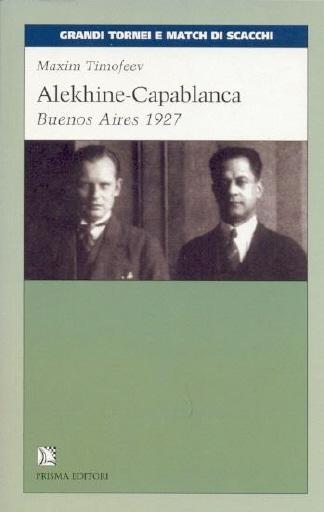
To avoid possible imprecision from using the Italian translations as intermediaries, we wonder whether a reader with access to the above Russian material could kindly send us an English version of the paragraphs containing the predictions.
Timofeev’s book also contains (pages 151-207) a digest of post-match observations by Alekhine, Capablanca, Lasker, Romanovsky, Ilyin-Genevsky, Levenfish, Réti, Tartakower, Spielmann and Brinckmann.
(4648)
In the Capablanca entry on page 64 of The Encyclopaedia of Chess by Anne Sunnucks (London, 1970) – and on page 75 of the second edition (1976) – David Hooper wrote:
‘As predicted by Bernstein and others who knew Alekhine well, there was no return match.’
What more is known about the predictions of Bernstein and ‘others’?
(4649)
No progress has yet been made with the matters raised in C.N. 4648, and here we add three questions: did Spielmann predict before the Buenos Aires match that Alekhine would not win a single game, did Vidmar declare that Alekhine had not the ghost of a chance, and did Bogoljubow state that Capablanca would win 6-3? Below is V. Soultanbéieff’s account of such supposed predictions, on page 15 of his book Le match Capablanca-Alekhine (Brussels, 1929):
‘La plupart des maîtres, également, prévoyait la victoire de Capablanca; citons Spielmann qui déclarait qu’Alekhine ne gagnerait pas une partie; Vidmar qu’Alekhine n’a pas l’ombre d’une chance; Bogoljubow que le score final marquerait 6-3 en faveur de Capablanca ...’
(4990)
From Christian Sánchez (Rosario, Argentina):
‘During the Capablanca v Alekhine world championship match Tartakower wrote an article on page 10 of the 31 October 1927 edition of La Prensa. He expressed confidence in Alekhine by mentioning an earlier article of his own (Magyar Sakkvilág, April 1927) in which he had stated that the match was more justified than ever and would not be one-sided:
“A fin de no aparecer influenciado por la situación actual de la misma [la lucha], citaré a los lectores de La Prensa mi artículo publicado en el número de abril de este año de la publicación Magyar Sakkvilág, en la que, después de preguntar si el ‘match’ Alekhine-Capablanca conservaba aún su razón de ser, expresaba mi opinión de que entonces más que nunca.”’
Could a reader provide Tartakower’s article in Magyar Sakkvilág?
Our correspondent notes that elsewhere in his report in La Prensa Tartakower mentioned Spielmann as one authority who had predicted that Alekhine would not win a single game in the Buenos Aires match.
(5116)
Christian Sánchez also provides an article by Hartwig Cassel (1850-1929) on page 2 of section 3 of the 21 August 1927 issue of La Prensa, although it was written in June (in New York). Cassel reported that in the opinion of the New York chessplayers the Capablanca v Alekhine match would not be of interest, as Capablanca would win easily. He stated that, on the basis of recent tournament results, Lasker and Bogoljubow had a greater right to challenge the Cuban, as Alekhine lacked the requisite stature for the match.
(5117)
Luca D’Ambrosio (Bolzano, Italy) has found various observations/predictions by Rudolf Spielmann in Sonntagsbeilage der Augsburger Postzeitung of 25 June 1927, page 104:

Two passages highlighted by our correspondent are given below, together with our translations:
‘Trotzdem Aljechin in New York teilweise glänzend spielte, würde es mich wundern, wenn er in dem im Herbst bevorstehenden Kampf um die Weltmeisterschaft gegen Capablanca auch nur eine Partie gewinnen würde.’ [Although Alekhine sometimes played brilliantly in New York, I should be surprised if, in this autumn’s world championship match against Capablanca, he were to win even a single game.]
‘Capablanca freilich hält mit seinen eisernen Nerven die fünfstündige Spielzeit glänzend durch. Schon wegen dieses Punktes allein glaube ich, daß Aljechin in seinem bevorstehenden Wettkampf keine ernstliche Chance hat.’ [Capablanca certainly maintains his iron nerve throughout the five hours of play. For that reason alone I believe that in his forthcoming match Alekhine has no serious chance.]
(5338)
Concerning predictions as to the outcome of the 1927 world championship match we have come across the view of Réti as published on page 12 of the Argentinian newspaper La Nación of 14 September 1927 and quoted on page 209 of volume one of Historia del ajedrez argentino by José A. Copié (Buenos Aires, 2007):
‘To assert, as does Maróczy, that victory is bound to go to Capablanca ... is to act as a fortune-teller. There will be reasons for saying that Capablanca is an exceptional master in our field, in that his career has no failures of any kind, yet if we make a thorough study of the characteristics of each player, if we consider the psychological factors that will come into play in the match and if, more importantly, we destroy the legend of Capablanca’s invulnerability – which has become a reality among aficionados – we shall conclude that there are no fundamental reasons for affirming with such certainty that the Cuban grandmaster must necessarily defeat the talented Slav player.’
‘Capablanca has an apathetic temperament, he does not have further ambitions and he is incapable of preparing himself intensely for a match of this kind, since it is annoying for him to have to think. By dint of his natural talent he has arrived where he is, but he does not love chess. He is admirably instinctive but lacks the energy to undertake strict training.
Alekhine, in contrast, has an extraordinary wealth of energy. When engaged in battle, he is driven by noble eagerness to excel himself, and he has subjected himself to training commensurate with the importance of the match to be played ...’
Christian Sánchez has provided the complete text of the newspaper item, in which Roberto Grau reported comments made to him by Réti in London that summer.
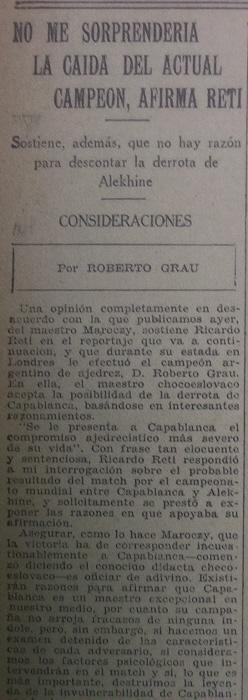
(5665)
The topic of Réti’s comments was raised in C.N.s 37 and 1162. The latter item quoted from ‘Chess Giants in an Unseen War –15.9 - 29.11.1927’ by Dimitru Taraoiu, published in Bonus Socius (The Hague, 1977):
‘Réti manifested another opinion: “Capablanca is apathetic. His natural talent pushes him upwards, but he didn’t love chess. He does not possess energy for severe training. He has, indeed, admirable nerves supporting him in all situations. Pure genius can fail. Alekhine has a solid luggage of novelties and a great combinative spirit, always in pursuit of victory.”’
C.N. 1162 noted that this text was credited to La Nación, 17 September 1927.
The following appeared as C.N. 2737 (see page 205 of A Chess Omnibus):
An uncanny prediction by Robert Byrne on page 162 of the March 1972 CHESS:
‘I believe Fischer will win. Would you like the score? 12½ to 8½! They will play 21 games.’
This was spot on, although Byrne’s next sentence was spot off:
‘Fischer will be the world champion for the next 15 years.’
Alan O’Brien (Mitcham, England) now writes:
‘It sounds very good, but how much of a prediction is it? Byrne is simply saying that Fischer will win 4 games to 0, or 5-1, 6-2, 7-3 or any +4 score. The winning score of 12½ was not hard to fathom; only Botvinnik playing Tal had been ruthless enough to win the last game in a non-drawn title match since the War.’
Byrne was one of 26 respondents in the CHESS item on forecasts for the 1972 match. Many were non-committal, and the others were equally split as to whether the victor would be Spassky or Fischer. Only Byrne predicted a specific score. Three masters suggested in general terms that Fischer was certain to win: Donner, Mecking and Najdorf.
(5681)
In an article ‘Masters and Experts View the Match’ by Bill Goichberg on pages 409-410 of the July 1972 Chess Life & Review several respondents (Herbert Seidman, Harry Borochow, Joseph Platz and John N. Jacobs) predicted that Fischer would defeat Spassky 12½-8½.
Reuben Fine’s prediction, Fischer by 12½-7½, was accompanied by the comment:
‘The odds are now (March) 4 to 2 that the Russians will dodge the match, using it as a political football.’
On page 15 of Bobby Fischer’s Conquest of the World’s Chess Championship (New York, 1973) Fine wrote:
‘The road was now clear for the final match with Spassky. Bobby was the favorite. I predicted that he would win 12½ to 8½. Others came up with other figures.’
(6257)
Jonathan Berry (Nanaimo, BC, Canada) quotes from page 21 of the September 1972 issue of Chess Canada:
‘Chess Canada’s Spassky-Fischer Contest Winners
Thirteen correct predictions were received by Chess Canada and each of these will receive a credit for $50 worth of books. The people correctly predicting a score of 12½-8½ were H. Winston, M. Mares, R. Eberlein, I. Zalys, C. Dwyer, P. Arens, R. Joho, J. Musumeci, J. Sember, H. Brodie, W. Browne, J. Burstow and the UBC Chess Club.
The final score of 12½-8½ was predicted 13 times, as was 12½-9½. The next most common prediction was 12½-10½ with 7. Fifty-seven entrants expected a Fischer win while ten predicted Spassky and only three expected a tie.’
(6262)
From page 15 of Soviet Weekly, 2 June 1973:
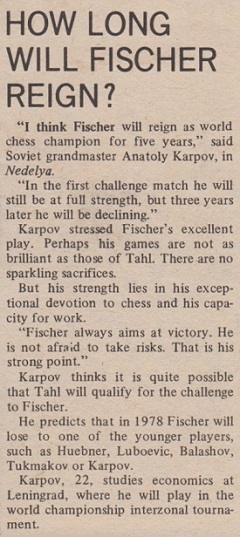
(9142)
Page vii of One Move and You’re Dead by Erwin Brecher and Leonard Barden (London, 2007) records that Barden ...
‘... was the first to predict in print that Garry Kasparov (then 11) would become world champion and that Nigel Short (then nine) would become Kasparov’s challenger.’
Regarding the Kasparov forecast, we are grateful to the Guardian Research Department for sending us the column in question (The Guardian, 24 February 1975, page 16) and for permission to reproduce it here:
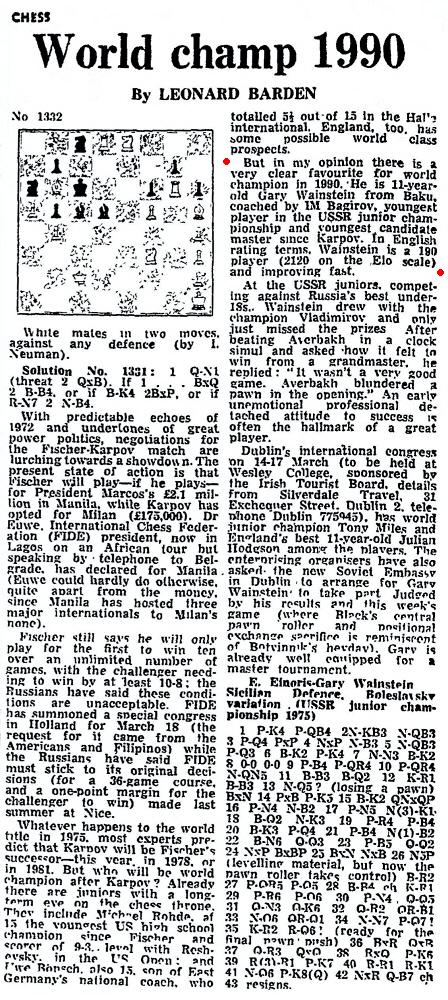
‘But in my opinion there is a very clear favourite for world champion in 1990. He is 11-year-old Gary Wainstein from Baku, coached by IM Bagirov, youngest player in the USSR junior championship and youngest candidate master since Karpov. In English rating terms, Wainstein is a 190 player (2120 on the Elo scale) and improving fast.’
In C.N. 507, after the prediction’s appearance on pages 5-6 of the book on Kasparov Fighting Chess (London, 1983), we described it as ‘an amazing piece of talent-spotting’. Fighting Chess called the passage ‘the first western report’ on Kasparov.
Further to the remarks about English players in the above Guardian column, Mr Barden informs us:
‘My comment that “England, too, has some possible world class prospects” was a reference to both Julian Hodgson and Nigel Short. It was not until March-April 1975, after Short had performed impressively in Jersey and in a junior event in London, that I rated him ahead of Hodgson, allowing for age, and as a potential rival for Garry Kasparov. At the end of the London event I asked Čenĕk Kottnauer, whose opinion on juniors I regarded highly, to analyse and play a game with Short, and Kottnauer was greatly impressed.
The invitation to the Soviet Embassy for Weinstein to play was on my prompting, my grounds being that he would be nervous on his first journey to the West and that Hodgson could gain a psychological edge for battles to come. Moscow refused.
My forecast in the Guardian of 24 February 1975 was made about 15 months before Botvinnik went into print with his famous remark about the future of chess being in Kasparov’s hands.’
(5783)
Addition on 9 May 2025:
From the Guardian chess column by Leonard Barden, 9 May 2025:
At international level, the boy to watch is Roman Shogdzhiev. The Russian, already world under-eight champion with 11/11 and world under-10 champion with 10/11, achieved his first IM norm last year aged nine, and has just scored his second IM norm at the Baku Open, registering a tournament performance of over 2500. Shogdzhiev is now on track to break the record of Argentina’s “chess Messi” Faustino Oro as the youngest ever international master.
The Garry Kasparov of the 21st century? In 1975, this column forecast that the then unknown 11-year-old Garik Weinstein (later Kasparov) would succeed Anatoly Karpov as world champion by 1990. Now, Shogdzhiev looks the part as the player to restore Russia’s lost chess glories in the next decade.
C.N. 7929 asked which prominent master estimated in 1936 that Euwe’s chances of retaining his world title against Alekhine were 90%. The answer is Rudolf Spielmann, as shown by an article on pages 68-69 of the May 1936 Schweizerische Schachzeitung:
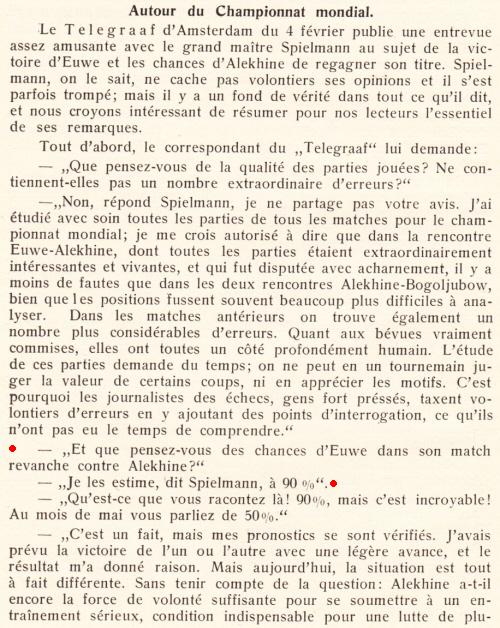
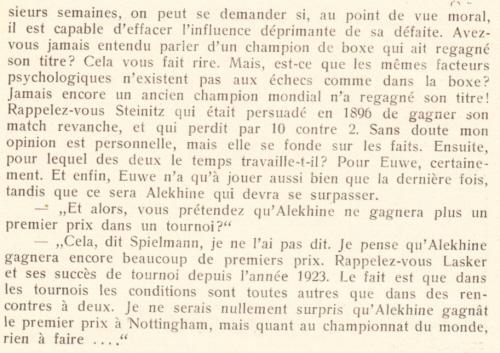
(7953)
On page 26 of the April 2004 Chess Life Larry Evans wrote:
‘“So it’s to be Short and it will be short”, quipped Kasparov upon learning the name of his challenger (who eliminated Anatoly Karpov and then Jan Timman, to reach the top).’
In reality, the famous quip was made by Kasparov during the Manila Olympiad in June 1992, long before the Short v Timman Candidates’ final (which ended on 30 January 1993). From page 462 of Garry Kasparov on Garry Kasparov Part II: 1985-1993 (London, 2013):
‘... journalists had asked me who would win the forthcoming final Candidates match – Timman or Short? – and how my next world championship match would end. To the first question I replied: “It will be Short.” And, laughing, I made the same reply to the second question: “It will be short.” On learning of this from the tournament bulletin, Short took offence ...’
In an interview with Dirk Jan ten Geuzendam (see page 54 of the 5/1992 New in Chess) Short light-heartedly dismissed Kasparov’s remark (which he gave as ‘It will be Short and it will be short’).
(8376)
C.N. 8376 pointed out incorrect information about when Kasparov made his ‘it will be short’ quip: it was in June 1992, i.e. some six months before the Short v Timman Candidates’ final.
Kasparov mentioned that the joke was reported in a bulletin of the Manila Olympiad, held in June 1992. Can a reader kindly forward us a copy?
(9221)
The bulletin (June 1992) of the Manila Olympiad has been provided by Henk Chervet of the Koninklijke Bibliotheek in The Hague:
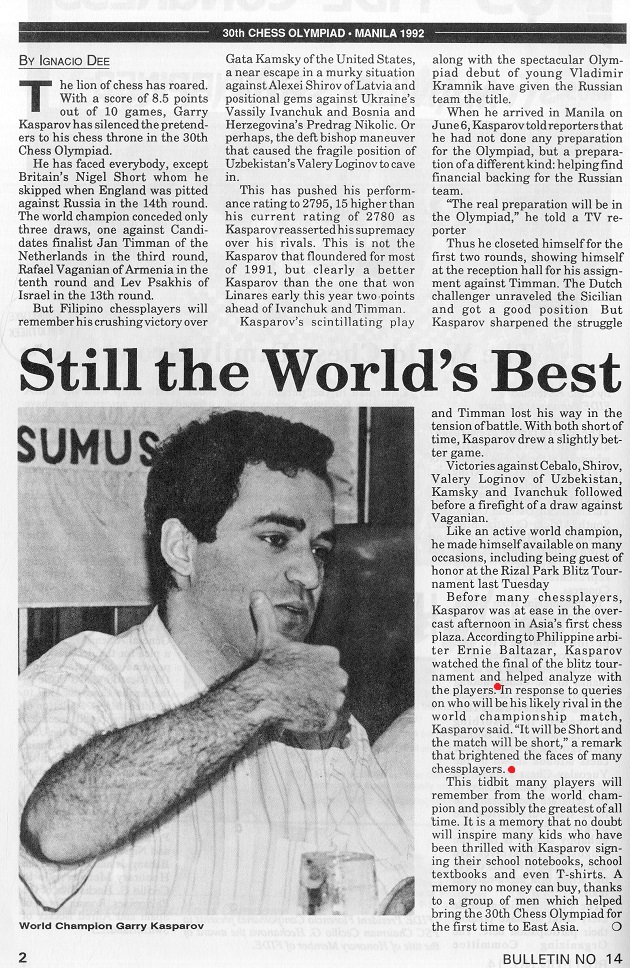
(9251)
Many people are unaccountably fond of predicting who will win chess matches and tournaments, but a rarer, darker form of prophecy concerns how a player’s life will end. The example that we have in mind is by Joseph Platz (1905-81): his prediction that Bobby Fischer ‘would end his life by suicide or die in an insane asylum’.
In a simultaneous display in 1964 Fischer was defeated by Platz, who annotated the game on pages 4-5 of the Spring 1964 issue of the Connecticut Chess Light. Annoyed that his greatest chess hero, Emanuel Lasker, was omitted from Fischer’s list of the ten greatest masters in an article in the January-February 1964 issue of Chessworld, Platz wrote:
‘My victory over Fischer gave me a double satisfaction in as much as I avenged Dr Lasker, whom Fischer does not even rate among the ten greatest players of all times, and whom Fischer calls a “weak player”. In the name of Lasker I answer, “Indeed for 27 yrs he was a very weak! player”. And I would add: Ask any group of players who was the greatest player of all times and some will say Alekhine, and some will say Lasker. But no-one will give Lasker less than second place.’
After quoting views on Lasker by Réti, Helms, Alekhine (inaccurately, as pointed out in C.N. 138), Fine, Capablanca, Reinfeld and Einstein, Platz concluded:
‘So much about some of the geniuses who paid homage to Lasker, the chessplayer, the mathematician, the philosopher, the writer, the playwright, this unique, this lovable personality.
And now I ask, can anyone say the same about Fischer? Playing chess, he knows that, perhaps better than anyone else, although he has yet to prove it. And how long will he stay at the top? 50 years, like Lasker? And what qualifies him to write chess history and rank players?’
When Platz’s article was reprinted on pages 4-5 of the Connecticut Chess Newsletter, Winter 1978-79, the sentence ‘And what qualifies him to write chess history and rank players?’ was omitted. Moreover, Platz added an afterword:
‘Please note that this was written by me in 1964, eight years before Fischer became World Champion. At that time I predicted that Fischer would become World Champion, that he would keep his title for not more than six years, that he would end his life by suicide or die in an insane asylum.’
From page 5 of the Connecticut Chess Newsletter, Winter 1978-79
The full article in the Connecticut Chess Newsletter was reproduced on pages 44-45 of Chess Horizons, April-May 1979. It was also given on pages 135-137 of Chess Memoirs by Joseph Platz (Coraopolis, 1979), but ‘he would end his life by suicide or die in an insane asylum’ was replaced by ‘he would die like Paul Morphy’.
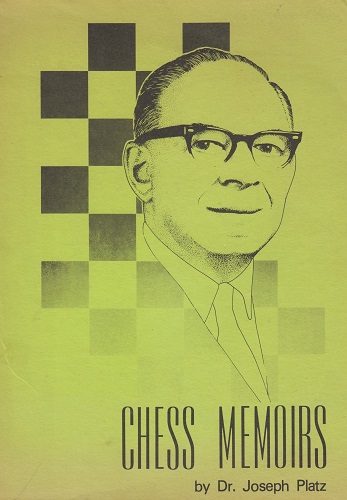
Concerning Platz’s claim (page 5 of the Connecticut Chess Newsletter, Winter 1978-79) ‘At that time I predicted ...’, the wording could be taken to refer to either 1964 or 1972. As shown above, Platz’s article in the 1964 Connecticut Chess Light made no predictions of any kind, but merely asked rhetorically whether Fischer would, like Lasker, stay at the top for 50 years.
On page 410 of the July 1972 Chess Life & Review Platz was one of a stream of pundits who dispensed opinions on the Reykjavik match. Predicting a final score of 12½-8½, he commented:
‘Fischer’s knowledge of the game, his natural ability, his will to win every game, even when he has no advantage, will carry him to victory. ... Spassky is under greater pressure ... what will happen to him if he loses the match? ... Fischer will fight with confidence; he is under obligation to nobody.’ (Ellipses in the original.)
Can further relevant remarks by Platz about Fischer be found?
Acknowledgement: the two Connecticut chess publications have kindly been provided by the Cleveland Public Library.
(10241)
Addition on 5 June 2025:
Tony Bronzin (Newark, DE, USA) quotes the following remarks by Yasser Seirawan at the conclusion of an interview with Frank Elley on pages 23 and 53 of the September 1983 Chess Life:
‘My future is very bright. The problem is I seem to be the only one who knows this. I would like everyone to share this little secret.
My goal as a chess professional has never wavered. I shall be the world champion.’
To the Chess Notes main page.
To the Archives for other feature articles.
Copyright: Edward Winter. All rights reserved.